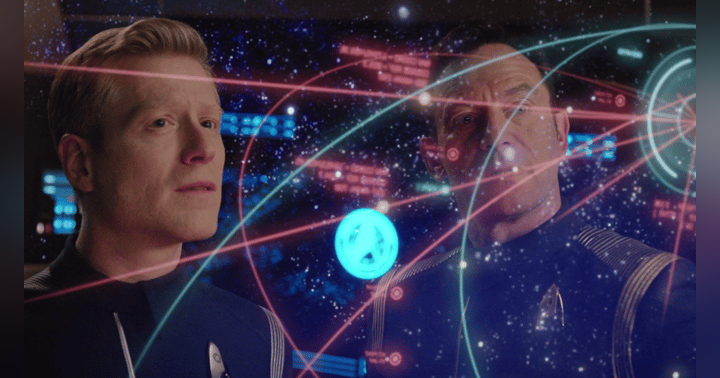Today’s focus is unique - for this blog as well as Star Trek: The Next Generation. In fact, this topic is a total departure from traditional Star Trek episodes. Today we’re going to talk about mental health, specifically in light of lived trauma.
Now, I want to give a disclaimer: I am not a mental health professional! I will share my thoughts and opinions on what I see in this episode, but I want to acknowledge my ignorance here. If I am wrong, I apologize. I also ask that if I am wrong about something, please educate me! I want to learn and grow. Mental health is essential, so it’s worth talking about here. I believe it is all too often stigmatized, mocked, and misunderstood.
I look forward to a time where we, as a society, embrace mental health and well-being as part of our total health. And maybe Star Trek can even be a small part of helping us get there.
The primary focus of this episode is on Picard. After being assimilated by the Borg, he is essentially responsible for the destruction of 39 starships and the death of over 11,000 people. Can you imagine? This kind of devastation doesn’t happen without leaving a significant mark on you. He is understandably traumatized by the experience. I’m so glad we get to see Troi’s care of Picard in this episode. This is one of the first times we watch Troi actively in her role as a counselor. She’s asking questions, challenging assumptions, and helping Picard stay on a path to improving his mental health.
From their interactions at the beginning of the episode, we know that Picard has been working regularly with Troi on his healing. And while we don’t get to see ongoing care, we can assume he receives that as well. This is the first observation I would like to make: seek mental health care from a professional. I would never try to diagnose or treat a serious physical illness or injury. So why do we insist on doing so for mental or emotional distress?
Picard travels to Labarre, France, in search of rest and a visit with his brother. What he finds is tension and an inability to escape his trauma. It doesn’t take an expert to see that he is holding a volcano at bay inside of himself. Eventually, a fight with his brother breaks the dam, and everything spills out. Through deep tears, he shares some of his grief from the recent events. His brother aptly responds, “This is going to be with you a long time.” This emotional release was incredibly needed and most likely helpful. But it doesn’t mean he’s cured. It means his healing can begin. Just like healing a broken bone, mental healing takes time.
In addition to this, it’s important to note that mental illness does not discriminate. Back in the second episode of the Starfleet Leadership Academy, we saw Picard as a leader who was very much concerned with maintaining his appearance. He identified himself with his job and title. In this episode, all of that goes out the window. We see a version of him that we can all relate to: a guy trying to keep it together when his world has fallen apart. No amount of power, accomplishment, or money can protect you from that. This episode proves a valuable point - it doesn’t matter what your title is or how high up the chain of command you are, we’re all human, and we all need help.
Let’s take a look at another character who is processing through trauma in this episode. Dr. Crusher lost her husband, and her son lost his father. Again we see Troi support a member of the crew with their mental health. Crusher and her son, Wesley, are working through their loss and grief. Loss is an experience we all have. It may look different for some of us, but it is never easy. Crusher is wise to lean on her friend (and mental health professional) at this time. Looking at it through the lens of leadership development, the lesson here is to know when to rely on or consult with someone else.
There’s a great quote: “If you’re the smartest person in the room, you’re in the wrong room.” You should always be seeking to surround yourself with people that are smarter than you or know different things than you. This relationship shows the benefit of that. Had Crusher not developed a circle of brilliant colleagues, she would likely have missed out on invaluable advice from Troi. What advice are you missing out on? Check your room, check your team, and be sure you are not the smartest one there.
We’ve made some observations about how to care for our personal mental health as individuals and leaders. But what about the people we’re responsible for? What can we learn from this episode about how to care for, or at least encourage mental health among our team? It is my experience that when people are supported and cared for, they work harder, their productivity increases, and the quality of their work goes up. Actively investing in the people on your team does result in a net gain. In fact, I would say it is the most sound investment you can make.
There are a lot of ways you can support your teams. Depending on where you live and work, some of that may be provided or mandated by the government. Or you may need to make it a reality in your workplace. Either way, offering things like paid time off (for any reason) or flexible schedules to allow for life to happen and to provide safe and quiet spaces for people to take a moment and breathe can make a dramatic difference for people. When your team experiences you prioritizing their mental health at work, they will want to be there, and they will be more likely to give their best to the work.
I love the example of how Riker, without hesitation, offers Worf extra time off to be with his parents. Riker knows that allowing the crew the time they need to take care of themselves and the people around them is critical. I have a colleague that works for a global company. In their division, they have “no meeting Wednesdays” to give everyone a day of relief. Their leadership does quarterly reviews of their accrued paid time off to be sure people are taking time off. Real time off! Not the kind of PTO where you still respond to team messages and check emails. What we know is that healthy people perform better. Our role as leaders is to improve the performance of our teams. So, a focus on total health is the only logical choice. It is critical to acknowledge that mental health is a vital part of our total health.
Here’s the bottom line: it is important to take care of yourself. It is especially important to take care of your whole self when you are a leader and to extend that same value of whole wellness to your team. I hope you enjoyed this unique episode and its important reminders. Do you actively work to prioritize your own mental health and promote well-being within your team? Do you have methods or ideas we all could learn from? Let me know!



